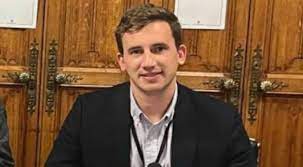By Tony O’Reilly-
A parliamentary researcher who was arrested on suspicion of spying for China has vehemently denied the allegations, asserting his innocence in a statement released by his legal representatives.
The researcher was one of two men arrested in March under the Official Secrets Act.
It is understood the researcher had access to several Conservative MPs.
China has rejected the allegations of spying, with foreign ministry spokesperson Mao Ning calling it “malicious slander”.
The researcher revealed by The Sunday Times as Chris Cash, a 28-year-old history graduate and “long-suffering Scottish rugby follower,” according to an archived version of his Twitter account.
Police confirmed that Cash, and a second in his thirties had been arrested on suspicion of espionage offences in March. The man in his twenties is reported to be a Commons passholder, who has been linked to a number of senior Tory MPs.
Cash was also reportedly a fixture on the parliamentary social scene, highly affiliated with civil servants, aides, researchers, and journalists at boozy events.
Cash expressed being frustrated at having to address the allegations from the media. He said: “I feel forced to respond to the media accusations that I am a ‘Chinese spy.’ It is wrong that I should be obliged to make any form of public comment on the misreporting that has taken place.”
However, he felt compelled to clarify his position given the gravity of the accusations. “It is vital that it is known that I am completely innocent. I have spent my career to date trying to educate others about the challenge and threats presented by the Chinese Communist Party,” he stated. “To do what has been claimed against me in extravagant news reporting would be against everything I stand for.”
This startling revelation has sent shockwaves through the UK political landscape, with the individual in question reportedly having ties to prominent figures, including security minister Tom Tugendhat, foreign affairs committee chairwoman Alicia Kearns, and other senior Tory MPs.
The researcher, who is in his 20s, was arrested in Edinburgh on March 13, according to Scotland Yard. His arrest followed a simultaneous arrest of another man in his 30s in Oxfordshire on the same day. Both men were held on suspicion of offenses under section one of the Official Secrets Act 1911, which deals with actions “prejudicial to the safety or interests of the state.”
The Metropolitan Police confirmed on Saturday that two men were arrested under the Official Secrets Act in March.
These developments have put a spotlight on the government’s stance toward China and ignited a debate over whether a tougher approach should be adopted. Prime Minister Boris Johnson has generally pursued a diplomatic approach to Beijing, but some members of his cabinet and party advocate for classifying China as an official threat.
Rishi Sunak, the Chancellor of the Exchequer, confronted Chinese Premier Li Qiang at the G20 summit in India, condemning what he termed “unacceptable” interference in democracy, a direct response to the espionage allegations.
Business Secretary Kemi Badenoch weighed in on the matter, echoing Sunak’s approach. “China should not be considered a ‘foe’ but a ‘challenge,'” she said. While acknowledging the seriousness of the spying allegations, she emphasized the importance of measured language when discussing international relations.
The incident continues to evolve, with ongoing investigations by the Metropolitan Police’s Counter Terrorism Command, which handles espionage-related offenses. The arrested individuals have been released on bail until early October, pending further developments.
The allegations and subsequent investigations have raised significant questions about national security and the UK’s position in relation to China, setting the stage for further political debate and international diplomacy..
In the words of Mao Ning, spokesperson for the Ministry of Foreign Affairs, “the so-called espionage in the UK is non-existent” and all part of a campaign of “false information” and “malicious framing of China”.
China has responded to recent espionage allegations in the United Kingdom with its typical strategy of categorical denial, accompanied by accusations of “false information” and “malicious framing” by the UK authorities.
Mao Ning, the spokesperson for China’s Ministry of Foreign Affairs, addressed the issue, stating unequivocally, “the so-called espionage in the UK is non-existent.” He further asserted that the allegations were part of a concerted campaign to spread “false information” and engage in “malicious framing of China.”
This reaction from China aligns with its historical approach when confronted with similar accusations. In particular, it draws parallels to the infamous spy balloon incident, where even when confronted with compelling evidence, China adamantly denied any wrongdoing.
The spy balloon incident, which occurred in the early 2000s, involved a US surveillance balloon that had crashed in Chinese territory, carrying surveillance equipment. Despite the United States possessing hard evidence, China maintained its denial of any espionage-related activities. Such a stance is seen as crucial to safeguarding China’s image as a responsible global actor on the world stage.
China’s response to espionage allegations abroad is rooted in its commitment to maintaining a reputation of non-interference in the internal affairs of other nations. This approach, while drawing criticism from some quarters, is consistent with its broader foreign policy of non-aggression and adherence to principles of sovereignty.
As the espionage investigation in the UK unfolds, it is likely that China’s stance will continue to be one of denial and the rejection of any involvement. This latest incident has once again highlighted the complex dynamics of international relations and the challenges of addressing allegations of espionage in an interconnected world.
Image:Twitter




